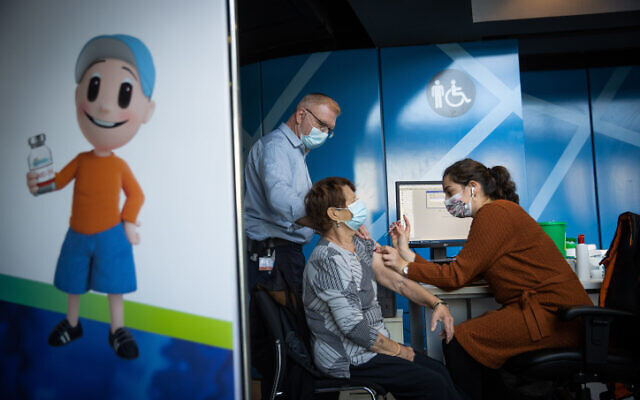Health minister insists ‘there’ll be no shortage,’ with Netanyahu said to be in contact with Pfizer to ensure stocks don’t run low in January

Israel is closing in on half a million vaccinated, Health Minister Yuli Edelstein said Monday night, as it continues to accelerate the rate at which it is inoculating citizens against COVID-19.
Israel began its vaccination drive last week, focusing on healthcare workers, over 60s, and at-risk groups, and is leading the world in vaccinations per capita. A record 99,000 people were vaccinated on Sunday, bringing the national total to 379,000, and Edelstein indicated that a new record of over 100,000 were given shots on Monday.
Edelstein dismissed rumors that stocks of the Pfizer vaccine Israel is using were running low. “I hear all over the place rumors about a grave shortage in the vaccines,” he said. “There is no shortage, and there will be no shortage.”
With Israel’s education system functioning largely as usual, even amid the current lockdown, teachers are also to be prioritized for vaccination from the start of next week, with Tel Aviv announcing that it will start inoculating teachers from Thursday.
Provided Israel maintains this week’s pace of over 100,000 inoculations a day, it will see a dramatic easing of the pandemic crisis next month, said Eran Segal, a biologist at the Weizmann Institute of Science who has been mapping and analyzing the impact of COVID-19. “In two to three weeks, we’ll start to see a very significant fall in serious cases among the elderly and at-risk groups, and after that, of course, a reduction in fatalities.”

Dr. Sharon Alroy-Preis, the acting head of the Health Ministry’s public health services, was a little more cautious, hailing the speed of Israel’s vaccination drive, but also noting that the vaccine is only 95 percent effective, and that COVID-19 could yet mutate problematically — even though the vaccines are increasingly thought to be effective against the highly contagious so-called British mutation.
Officials have said they aim to reach 150,000 vaccinations a day in the course of this week, and Prime Minister Benjamin Netanyahu has set a goal of having some 2.25 million Israelis — more than a quarter of Israel’s 9.2 million population — vaccinated by the end of January.
The Meuhedet HMO warned Monday that it would have to slow the pace of vaccinations if it does not receive further supplies in the next four days, Channel 12 news reported on Monday night. But Alroy-Preis said the ministry was working “around the clock” to ensure there would be no let-up. She said Israel was “mainly in contact with Pfizer” to ensure sufficient supplies.
Channel 12 said Israel expects to receive a total of 3.8 million doses of the Pfizer vaccine by Thursday — enough to vaccinate 1.9 million people, since the Pfizer vaccine is given in two shots, three weeks apart. Alroy-Preis said the HMOs are setting aside the second vaccine dose for each person inoculated.
The TV report said 4 million more doses are expected from Pfizer in February, and a million from Moderna, and that Prime Minister Benjamin Netanyahu is in contact with Pfizer to ensure that Israel does not run short in January.
Alroy-Preis had said on Friday that the aim was to start vaccinating the general public within 7-10 days. Some members of the general public have already been vaccinated, however — in some cases as walk-ins at vaccination centers where officials did not closely follow the guidelines on whom to prioritize, and in others, where vaccination centers had supplies that were about to expire. In Arad in southern Israel on Monday evening, for instance, the city council invited the public to a local vaccination center where it had 1,000 doses that needed to be used right away, triggering long lines of would-be vaccinees. Similar scenes played out in Safed in the north.
Israel currently ranks first globally in vaccinations per capita, slightly ahead of Bahrain and quite significantly ahead of other countries, according to the University of Oxford-run Our World in Data.
As reported by The Times of Israel
